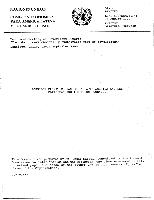Designing Projects within the GEF Focal Areas to Address Land Degradation: with Special Reference to Incremental Cost Estimation
The aim of this paper is to illustrate how projects could be designed to address land degradation through the four focal areas; with special reference to incremental costs assessment. Approaches the question from a generic form through to specific examples.





